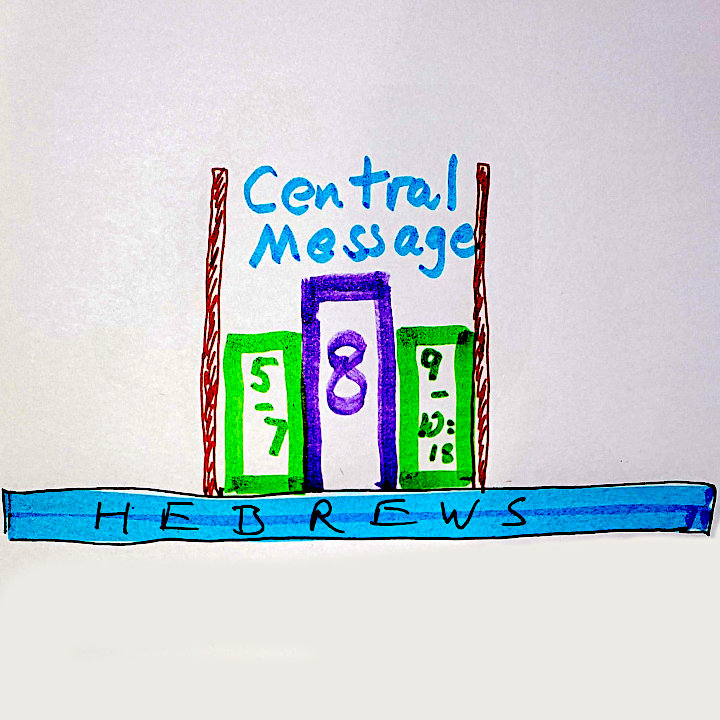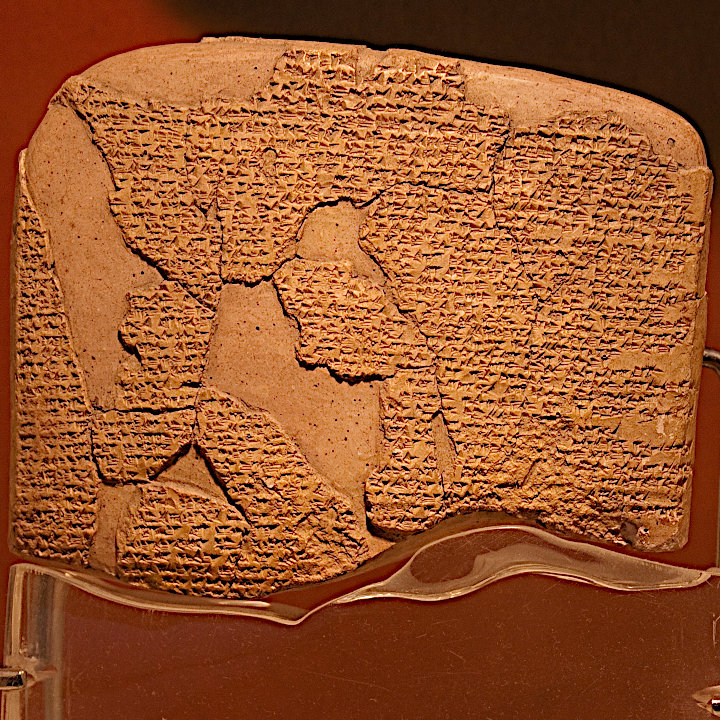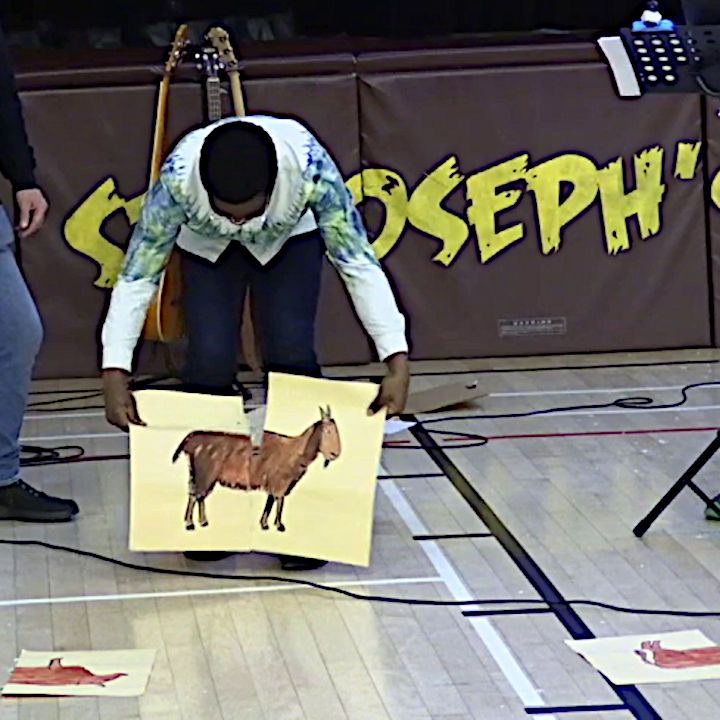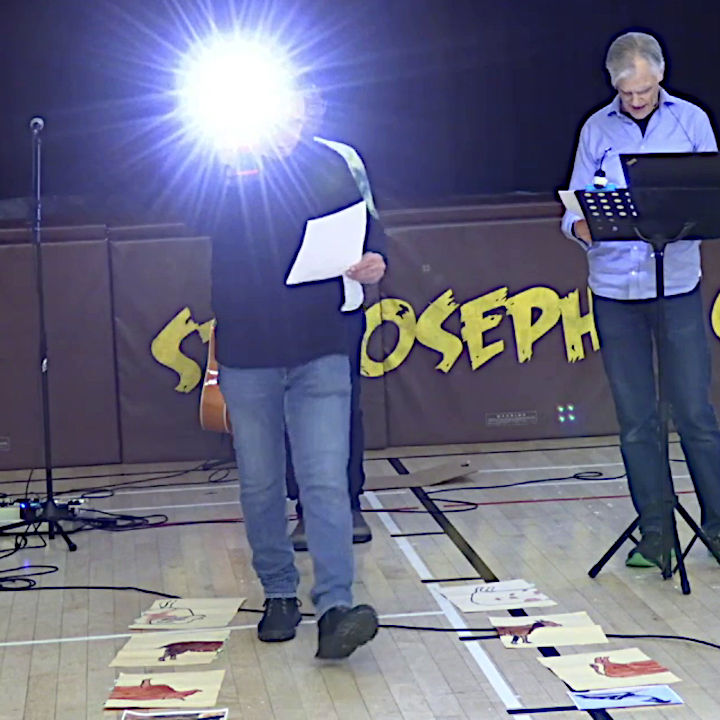- There are a lot of rich images when we break bread together as a church.
- In this talk we explore how it connects us with Jesus in the New Covenant.
Play Audio:
Video cover image by James Coleman Unsplash
The New Covenant Meal
- Summary of the New Covenant
- What is a Covenant Meal?
- The New Covenant Meal in Hebrews
- Let’s Celebrate it right now!
1. First a quick review of last week
- Last week we came to the central section of Hebrews
Overview

- The book is symmetrical
- Right in the center of the center is the New Covenant, which has replaced the covenant with Moses
- We did some background on Covenants, which was the ancient way of making an agreement
- In the last 100 years, archeology has helped us immensely as we have discovered covenants from the surrounding culture contemporary with the Old Testament.
“Hittite treaty of Kadesh”

Image source: wikimedia
“A forever relationship with serious commitments”
- Last week we did a re-enactment of the covenant with Abraham, which was a prophetic picture of the New Covenant
Abram divides animals

God symbolized: flaming torch went alone between pieces

- Abram didn’t have to make any promises
- Only God went between the pieces—Do you remember what that fact symbolized?
- Very important to note that:
- The later covenant with Moses and Israel at Mt. Sinai was totally dependent on them keep the law
- You do this
- I will do this
- But the New Covenant is the one prophetically shown in the covenant with Abraham
- Last week I challenged you to remember the 4 promises God made to us in the New Covenant:
Four Promises:
- If you are a member of the New Covenant:
- You have a new heart, that like a butterfly wants to soar
- You are God’s beloved and he is your beloved. You are secure in the relationship
- You relate to God directly, not through human priests
- You are totally forgiven and God is never judging you or condemning you
The New Covenant Meal
- Summary of the New Covenant
- What is a Covenant Meal?
- The New Covenant Meal in Hebrews
- Let’s Celebrate it right now!
2. What is a Covenant Meal?
Some Covenants in the Bible
- Noah - Genesis 6
- Abraham - Genesis 15,17
- Nation of Israel - Exodus 6, 19, 24f
- King David (promise of Jesus)
- The New Covenant Jer 31:31, Luke 22, Hebrews etc.
Common elements of a Covenant:
- Commitments made by one or both sides
- Event (either real or symbolic)
- Meal together
- Way of remembering
- Some of the future promise now (deposit)
- Noah
- Some basic laws / never flood earth again
- saved from flood
- -
- Rainbow
- -
- Abraham
- will make you a great nation & land
- passing between animals
- Some suggest: later appearance of God in human form, who ate (Gen 18)
- Circumcision
- Son, burial plot
- Israel
- O.T. Law / promised land
- freed from slavery
- First Passover meal + amazing story of Exodus 24
- Passover
- Sabbath rest, manna
- New
- Faith / new life and inheritance
- the cross & resurrection
- Last supper
- Breaking bread
- Spirit (seal)
O.T. Passover: Exodus 12:
- “This day shall be for you a memorial day, and you shall keep it as a feast to the LORD; throughout your generations, as a statute forever, you shall keep it as a feast.
- Breaking Bread is the New Covenant replacement for the Passover
- The Passover centered around the sacrifice of a lamb—but we don’t need to have a sacrifice—it has already been made, “once and for all” Hebrews tells us.
- so why do I not call it “Communion”, or “The Lord’s Supper”, or “The Eucharist”
- Simply because this is the name the Bible calls it
- So why have people changed the name?
- because they have changed the event from what Jesus gave us (another time)
3. The New Covenant Meal in Hebrews
- So what are the references to this memorial meal in the letter to the Hebrews?
- There is not any explicit reference, but lots of implicit ones like this one which says King Melchizedek was a picture of Jesus:
- For example, King Melchizedek, who is a picture of Jesus in Hebrews, brought out bread and wine to Abraham in Genesis
Melchizedek: bread and wine
Genesis 14
- And Melchizedek king of Salem brought out bread and wine. (He was priest of God Most High.) 19And he blessed him and said, “Blessed be Abram by God Most High, Possessor of heaven and earth;
- Hebrews 7:1 For this Melchizedek, king of Salem, priest of the Most High God, met Abraham returning from the slaughter of the kings and blessed him
- The clearest connections are with the words “blood of the covenant”
- First see how Jesus makes the connection:
Blood of the Covenant
- Ex 24:8 Moses then took the blood, sprinkled it on the people and said, “This is the blood of the covenant that the LORD has made with you in accordance with all these words.”
- Matt 26:27 Then he took the cup, gave thanks and offered it to them, saying, “Drink from it, all of you. 28This is my blood of the covenant, which will be shed on behalf of many for the forgiveness of sins”
- Hebrews references both these events & ties them together with the same expression:
Hebrews also connects them:
- 9:18 Therefore not even the first covenant was inaugurated without blood. 19For when every commandment of the law had been declared by Moses to all the people, he took the blood of calves and goats, with water and scarlet wool and hyssop, and sprinkled both the book itself and all the people, 20saying, “This is the blood of the covenant that God commanded for you.”
- 12:24 [You have come] to Jesus, the mediator of a new covenant, and to the sprinkled blood that speaks a better word than the blood of Abel. (much more value than any since this first ever bloodshed)
- It does not specifically mention breaking bread, but Jesus quoted the exact same words as Hebrews does as the basis for breaking bread
Three Links in Hebrews
- Hebrews uses the same language as Jesus at the last supper when he says “This cup is the new covenant in my blood”
- Altar language – Eating the bread and wine is an act of participating now in what happened then at the altar of the cross
- …
- The cross is referred to by Paul as an altar in the past that we participate in now by breaking bread
1 Corinthians 10
Participants in the altar
- The cup of blessing that we bless, is it not a participation in the blood of Christ?
The bread that we break, is it not a participation in the body of Christ? - Because there is one bread, we who are many are one body, for we all partake of the one bread.
- Consider the people of Israel: are not those who eat the sacrifices participants in the altar?
Hebrews 13
But we eat at a better altar
- Do not be led away by diverse and strange teachings, for it is good for the heart to be strengthened by grace, not by foods, which have not benefited those devoted to them. (restrictive food laws)
- We have an altar from which those who serve the tabernacle have no right to eat. (Old Covenant worshippers)
- It is very important to note that this meal of breaking bread is not another sacrifice
The Catholic mass would make it a repeated sacrifice, offered up by a human priest
- Note that the letter to the Hebrews brings huge problems for Catholics and the mass
I am not setting out to bash Catholics here, but this is SO IMPORTANT.
- As I researched the connections between Hebrews and Breaking bread, I found a lot of Catholic websites trying to get around all the problems.
- They have a particularly huge problem with their teaching that the Mass is a sacrifice because of all the times Hebrews says that Jesus sacrifice was once, for all time!
- I found no less than 11 statements about this in Hebrews. Here is just one:
Hebrews 10
- For by a single offering he has perfected for all time those who are being sanctified.
- Does that sound good? or would you rather have to take bread and wine every week just to be forgiven?
- Now for the most exciting link that I want to end this section with:
Three Links in Hebrews
- Hebrews uses the same language as Jesus at the last supper
- Altar language – Eating the bread and wine is an act of participating now in what happened then at the altar of the cross
- Feasting with Jesus!
Exodus 24:
- And Moses took the blood and sprinkled it on the people and said, “Behold the blood of the covenant that the LORD has made with you in accordance with all these words.”
- Then Moses and Aaron, Nadab, and Abihu, and seventy of the elders of Israel went up,
- and they saw the God of Israel. There was under his feet as it were a pavement of sapphire stone, like the very heaven for clearness.
- And he did not lay his hand on the chief men of the people of Israel; they beheld God, and ate and drank.
Heb 12: New Covenant Feast with God on the Mountain
- But you have come to Mount Zion and to the city of the living God, the heavenly Jerusalem, and to myriads of angels,
- to the feast-gathering and assembly of the firstborn who are enrolled in heaven, and to God, the judge of all, and to the spirits of the righteous made perfect,
- and to Jesus, the mediator of a new covenant, and to the sprinkled blood that speaks a better word than the blood of Abel.
Isaiah 25
The Messiah will bring a new feast
- On this mountain the LORD of hosts will make for all peoples a feast of rich food, a feast of well-aged wine, of rich food full of marrow, of aged wine well refined.
- Ultimately this is the feast that Hebrews promises us
4. Let’s Celebrate it right now!
- This morning we are going to break bread together
1 Corinthians 11:23–26
- For I received from the Lord what I also delivered to you, that the Lord Jesus on the night when he was betrayed took bread,
- and when he had given thanks, he broke it, and said, “This is my body which is for you. Do this in remembrance of me.”
- In the same way also he took the cup, after supper, saying, “This cup is the new covenant in my blood. Do this, as often as you drink it, in remembrance of me.”
- For as often as you eat this bread and drink the cup, you proclaim the Lord’s death until he comes.
- So what does it mean to “remember”?
Why do we do it?
- Look backwards as we remember Jesus’s death
- Proclaim what he has done as a witness to others
- Demonstrate our unity in Christ
- Come to Jesus as a priest who forgives our sins
- Obtain a blessing as by faith we receive the benefits of Christ’s death
- Picture of depending on Jesus for sustenance
- Look forwards to feasting with Christ in glory
- Not magical / automatic blessing
- But not merely a symbol
- If you participate with belief and trust, then you are promised that you will receive a blessing
- Does it matter if it is alcoholic? —of course not! (Sri-Lanka: Coke)
- Food samples in a store. This is a taster of heaven!
Who is it for?
- Everyone who is part of the body, and not living in disunity
- If you have an issue with someone else here, sort it out first!
- If you have some kind of rebellious behaviour towards God, (=disunity) repent first!
- explain the difference between sin and rebellion
- If you are feeling very guilty for your sinfulness
- You are in exactly the right place!
- If you are not a Christian, then you need to decide
- To eat is a statement that you want to follow him
- What about children?
- They would have been part of the feast
- Warnings are not about how dangerous it is if not part of N/C
Summary—Why we do it:
- Look backwards as we remember Jesus’s death
- Proclaim what he has done as a witness to others
- Demonstrate our unity in Christ
- Come to Jesus as a priest who forgives our sins
- Obtain a blessing as by faith we receive the benefits of Christ’s death
- Picture of depending on Jesus for sustenance
- Look forwards to feasting with Christ in glory
- If you are not sure if it means this to you, and want it to:
- Go through these seven steps right now
- What this means for you now:
- You are symbolically saying yes to participating in the relationship, with all it entails
- Close with Luke 22
- And he took bread, gave thanks and broke it, and gave it to them, saying, “This is my body given for you; do this in remembrance of me.”
- In the same way, after the supper he took the cup, saying, “This cup is the new covenant in my blood, which is poured out for you.”





